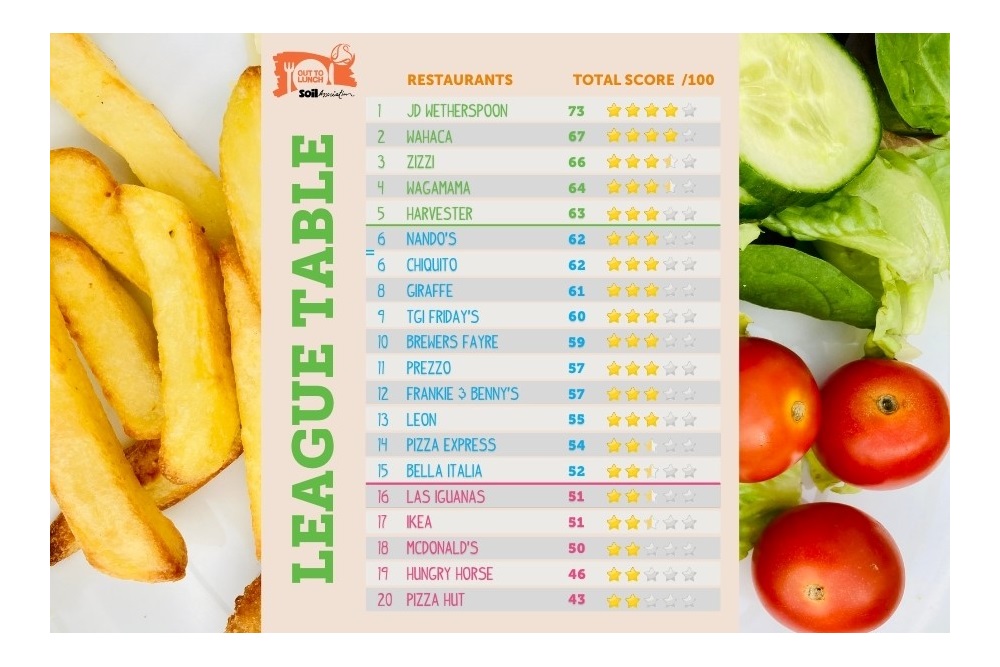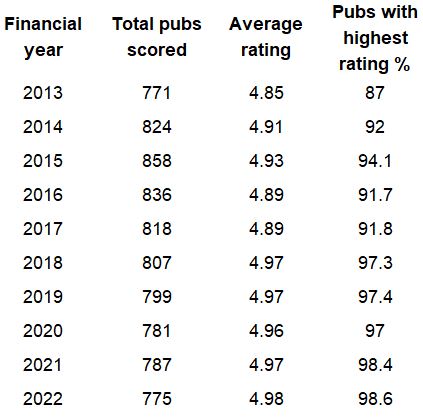Food served
J D Wetherspoon aims to provide a balanced menu which increases sales, offers customers variety and choice, when it comes to nutritional and dietary preferences, and gives transparency of information for customers to be able to make informed decisions.
Our menu, or food, philosophy is to ensure that every item is best in class (EIBIC) and to strive consistently to improve each item, meal and/or process.
The company has made several commitments in this area, including to:
- track the levels of kcal, sugar, fat and salt and not to increase the average consumption (by dish) of any of these, across our menu as a whole.
- offer a lighter or small portion alternative for all categories and meal occasions, including desserts and snacking.
- ensure that vegetables and/or salads are available on all menus.
- offer healthier alternatives for side orders on all menus, such as side salad and jacket potatoes.
- offer, where appropriate, the option of a smaller meal, by offering a lower price without the side orders (such as chips and onion rings), eg just-a-burger or smaller-portion-size meals, eg small fish & chips.
- remove artificial flavours and colours and as many of the 14 major allergens as possible.
- ensure that all meals are nut free.
Children’s menu
The company has made several commitments in this area, including to:
- monitor Calorie, salt and sugar levels in all food and drinks specifically marketed at children.
- provide a children’s menus offering credible healthier choices, with controlled levels of salt, added sugar, saturated fat and total fat.
- support and promote the five-a-day message for fruit and vegetables. All children’s meals will be served with two portions of vegetable or a side salad, plus a fruit portion.
- promote healthier choices, wherever possible, highlighting these healthier swaps on menus.
- not offer or promote to children fizzy drinks or any other drink which falls under the Soft Drinks Industry Levy (SDIL).
- have no artificial flavours or colours in any food marketed at children.
Food Foundation – Peas Please campaign
We support the Food Foundation’s Peas Please campaign and, in 2019, made the following pledge:
“We are ensuring that our children’s meals include at least two vegetable portions. We already have two portions as an option with all ‘bigger appetite’ dishes and most ‘smaller appetite’ dishes and plan to review how the default can be improved. We are also due to trial a free ‘carrot bag’ in early 2020, as well as menu redevelopment to get more ‘hidden’ vegetables included. With our pledge, we commit to aiming for continuous progress to increase the vegetable portions which we serve to children every year.”
Soil Association – Out to Lunch campaign
This campaign, run by the Soil Association, rated J D Wetherspoon as the best restaurant overall in 2021, with Wahaca, Zizzi and Wagamama close behind. The full table is below:

Health and nutrition, allergens
Full allergen/nutritional information can be found on our customer information screens in pubs, the website and the Wetherspoon app. Customers can ask at the bar, where staff will be able to direct them to this information.
While we have procedures for segregating preparation within meals and drinks, kitchen and bar service may involve shared preparation/cooking areas. If customers have specific food/drink allergen needs, we ask that they please inform us; we will take reasonable steps to prepare their meal safely, although cannot guarantee completely allergen-free environments or products.
Vegetarian dishes, vegan dishes, dishes which are less than 5% fat and dishes under 500 Calories are indicated by symbols on the menu.
Public Health Responsibility Deal
We have supported the Public Health Responsibility Deal from its introduction in 2011
The
public health responsibility deal was established to tap into the potential for businesses and other organisations to improve public health and tackle health inequalities through their influence over food, alcohol, physical activity and health in the workplace.
The company signed up to the following pledges in the food section:
- Calorie reduction
- Salt catering: reformulation of products as purchased by the customer
- Salt reduction
The company signed up to the following pledges in the alcohol section:
- Awareness of alcohol units in the on-trade
- Tackling underage alcohol sales
- Supporting Drinkaware
- Responsible advertising and marketing of alcohol
- Supporting community actions to tackle alcohol harm
Responsible alcohol-retailing
We support practices which promote sensible drinking and have established a ‘code of conduct for responsible retailing’, outlining our approach in this area.
In October 2014, we were the first major on-trade alcohol retailer to include the alcohol unit content of all drinks on our menu. Alcohol units are now displayed on the Wetherspoon app and the customer information screens in pubs.
We also seek to develop partnerships with local authorities and the police. All pubs are requested to become a local pubwatch scheme member (this scheme promotes a safe and responsible drinking environment).
In several locations, a company pub manager chairs the scheme and, where there is no pubwatch, we work with the local police and council to try to establish one.
In January 2023, 535 pubs were members of an active Pubwatch scheme.
We support and work with several cross-industry organisations, including the British Institute of Innkeeping, UK Hospitality (UKH) and the British Beer and Pub Association (BBPA). A company representative sits on the National Pubwatch committee; we also financially support Drinkaware.
We encourage our pubs to enter the Best Bar None schemes (run by local authorities and the police, to encourage good behaviour in town centres), promoting a safe and secure environment.
In January 2023, 88 pubs were accredited by a Best Bar None scheme.
Responsible gambling
The company applies proof-of-age policies to anyone playing gaming machines to ensure that they are not played by customers aged under 18 years.
Responsible gambling messages are displayed on digital gaming machines, with information also provided about support organisations for problem gambling.
The company is currently trialling digital age recognition software.
Food safety and health and safety
Wetherspoon has always emphasised the importance of hygiene standards.
As at 8 September 2023, we have 756 pubs rated on the Food Standards Agency’s website (see table below).
The average score is 4.99, with 99.6% of the pubs achieving a top rating of five stars. We believe this to be the highest average rating for any substantial pub company.
In the separate Scottish scheme, which records either a ‘pass’ or a ‘fail’, all of our 57 pubs have passed.

With Milton Keynes Borough Council, we have signed a primary authority partnership (under the Better Regulation Delivery Office scheme) for health and safety, food safety and trading standards.
Monitoring standards
Every pub receives at least five quality-assurance visits each month from a combination of its area manager, the audit department, an external ‘mystery shopper’ company and other head-office managers. The scores from these visits are combined and form part of the bonus scheme for all pub-based employees.
There are 846 pubs (99%) accredited by Cask Marque for the quality and consistency of the real ale
which they serve. In addition, 95% of pubs have achieved either a 4 or 5 rating on the Cask Marque Beer and Cellar Hygiene Audits – the industry average is 73% of pubs (which participate in these assessments).
CAMRA’s Good Beer Guide
There are 234 Wetherspoon pubs listed in CAMRA’s Good Beer Guide 2023 (2022: 213 pubs) – a larger proportion, we believe, than any other substantial pub company. The list of pubs is available here.
Sustainable Restaurant Association (SRA) – Food Made Good sustainability award
J D Wetherspoon has been awarded the highest rating of three stars on the Food Made Good standard, the world’s largest sustainability certification tailored for the hospitality sector. The standard evaluates the impact across three pillars: sourcing, society and environment.
The SRA says: “Limiting global warming to 1.5ºC is a large, urgent challenge and requires each of us to act. It is not enough for businesses to signal that sustainability matters – they must demonstrate that they are taking action across all business areas. Diners care more than ever about sustainability. The Food Made Good standard is a third-party certification which signals to staff, suppliers and customers that we are a progressive business which understands that doing the right thing for people and for the planet is core to operations.”
Since the last assessment, the company has improved across all three pillars, scoring highest (79%) in the ‘environment’ pillar. The SRA noted that the company had already both completed a carbon footprint analysis and set reduction targets for the future.